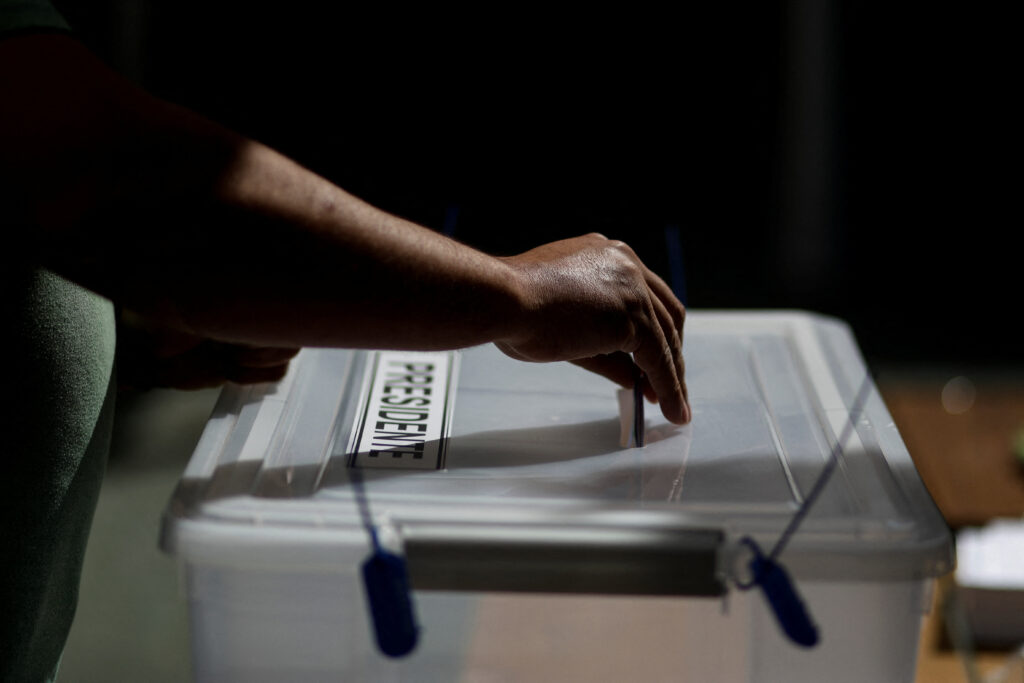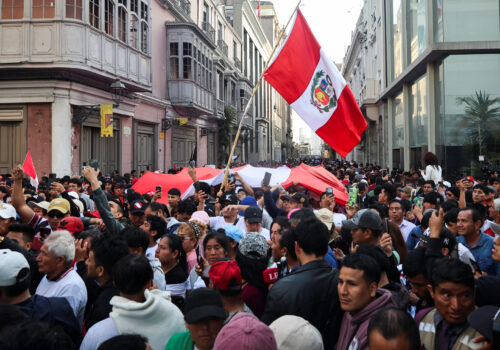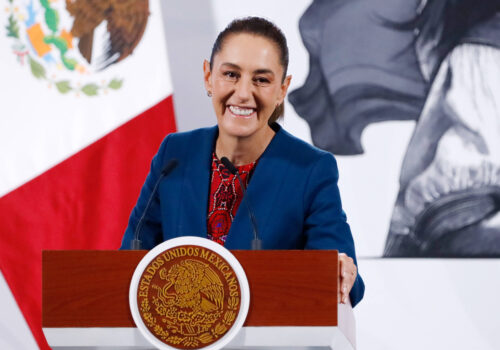Chileans voted yesterday for a new president, and as expected, no candidate reached the 50 percent plus one needed to win outright. The country now moves to a December 14 runoff: On the right is José Antonio Kast, who won about 24 percent of the first round vote. On the left is Jeannette Jara, who took 26.8 percent of the vote. While they come from opposite ends of the political spectrum, both candidates represent more change than continuity for Chilean politics. No matter which candidate wins, expect a shift away from the status quo.
Who advanced and why it matters
Even though he placed second in the first round, the Republican party’s Kast goes into the runoff as the stronger of the two candidates. This is because the other right-wing first-round candidates took a combined 30 percent of the vote—a share that could largely go to Kast in the next round.
Having lost the second-round election in 2021 to current President Gabriel Boric, Kast returned this year with a message centered on security and a smaller state. Jara, the candidate from the governing Unidad por Chile coalition on the left, has been working to expand her reach by presenting herself as grounded in the working-class experience and ready to provide steady governance.
It’s worth looking at the candidates that didn’t make it into the second round, too. One of the biggest surprises was Evelyn Matthei, presidential candidate for the center-right Chile Vamos coalition. She was a front-runner early in the year but lost momentum as Kast rose in the polls. On Sunday, Matthei finished fifth, even though she was polling third in the final weeks. The so-called “voto oculto,” or “hidden vote” not reflected in polling that she needed to win, never materialized.
The fate of Franco Parisi was also notable. He captured almost one in five votes and reinforced his role as the country’s most unpredictable political force. Throughout the campaign, he rejected ideological labels and marketed himself as neither right nor left—“ni facho ni comunacho.” His voters tend to be skeptical of political institutions and have a reputation for focusing on short-term concerns and outcomes. Surveys already show around 40 percent of Parisi’s voters leaning toward Kast, about 20 percent toward Jara, and the rest undecided. Both finalists now need support from Parisi’s voters to win the runoff.
The last two standing
Here is what we know about the remaining candidates. Kast comes from the hard right, and throughout the campaign he has underscored his social conservatism and his goal of enacting major spending cuts. He has called for lower taxes for high earners, new investment incentives, mass deportations, and a security model inspired by Salvadoran President Nayib Bukele. Some commentators have compared Kast’s political approach to that of US President Donald Trump. His place in the runoff surprised few since he stayed near the top of the polls all year. After the first-round votes were announced, Matthei and Kaiser endorsed Kast. He now needs to convince center-right voters to unite behind him.
If Kast comes from firmly on the right, his opponent is situated at least as far on the opposite end of the political spectrum. Jara represents the Unity for Chile coalition and belongs to the Communist Party. She served as labor minister under Boric, and she worked in the Bachelet administration before that. At the same time, she has tried to set herself apart from the current government. Earlier this month, she criticized Boric for not greeting Argentinian President Javier Milei and said she would not have acted that way. She has also questioned the 2026 budget bill. She has highlighted pension reform, wage increases, and a shorter work week as her past achievements. Her security plan includes more resources for the police, biometric border controls, and new prison infrastructure. But she now faces a difficult path. She delivered one of the lowest results for the left in recent cycles. With other left-leaning candidates taking under 1.5 percent of the vote, she must win over Parisi’s supporters to stay competitive.
What drove voters and what comes next
This election cycle comes as Chile remains politically fragmented. The country has shifted between the right and the left for more than a decade, and the back and forth has made it difficult to build long-term policy. Like much of the Western Hemisphere, concern about security and migration continues to push voters toward tougher positions on those issues.
This election was also the first presidential vote with compulsory participation in decades. Compulsory voting was practiced from 1925 to 2012 and reintroduced for 2023. More than 13 million people cast ballots—almost double the usual turnout. That surge reshaped the map. Regions with the highest share of first-time mandatory voters showed the sharpest drops for Jara and strongest gains for Parisi. Many of these voters reject both major coalitions and use their votes to punish whoever is in power at the time.
Security drove much of the debate. Chile remains one of the safest countries in Latin America, but violence has increased in recent years. Groups such as Venezuela’s Tren de Aragua expanded into northern regions, such as Arica y Parinacota and Tarapacá. Kidnappings, extortion, and organized criminal activity have increased. Drug trafficking and migrant smuggling continue to push homicide rates higher. In Santiago, carjackings, home break-ins, and muggings have become more common. Researchers estimate that crime costs Chile nearly eight billion dollars each year.
The economy is also a central issue. Chile has faced slow growth for several years now, and unemployment remains at about 9 percent. Investment has stayed flat. Inflation and the high cost of living shape everyday decisions. Many voters see the current administration of President Gabriel Boric as underperforming on these issues and, it seems, punished Jara for her role as labor minister. One issue sure to feature prominently in the second round is the budget. The legislative commission formed to review the annual budget bill recently rejected the 2026 budget bill, and the two candidates will likely spar over spending plans for next year.
The finalists now offer two very different paths. Jara supports stronger social programs, more resources for the police, and new tools for policing the country’s borders. Kast favors closed borders, maximum security prisons, and military deployment in the neighborhoods most affected by violence. Chileans must now decide which approach they trust to deliver results.
What it means for the United States
Santiago’s relations with Washington will likely vary depending on who wins, but both candidates face pressure to revive growth and attract investment. While Chile has struggled to bring in foreign direct investment at the levels it once did, the United States is still the country’s second-largest source of foreign investment, much of it concentrated in energy, data centers, and mining. These three sectors are likely to continue to shape the US-Chile economic partnership.
If Kast wins, Chile will likely move closer to Washington on regional security and migration. Trump’s team has focused on border control and transnational crime, areas where Kast might want to cooperate with the United States. Kast supports market-focused policies and favors free trade. The combination of security cooperation, interest in attracting capital, and a new economic agenda could create space for new bilateral initiatives. Kast may also choose the United States as one of his first international destinations.
If Jara wins, relations with the United States would continue but with more caution. She rarely comments at length on foreign policy and focuses mostly on domestic priorities. She and Trump would likely disagree on several issues; still, she seems to understand the scale of Chile’s security challenges and may seek cooperation on border management and reducing organized crime. If she wins, investors will watch how she approaches productivity, permitting, and the rule of law. These issues rank highly for US companies operating in Chile. Chile now enters a decisive period. The runoff will shape the country’s security, economic recovery, and its role as a partner for the United States. Washington should watch closely.
Maite Gonzalez Latorre, who was born in Chile, is a program assistant at the Atlantic Council’s Adrienne Arsht Latin America Center.
Further reading
Mon, Oct 27, 2025
Milei just got a midterm boost. What’s next for Argentina?
Fast Thinking By
The party of Argentine President Javier Milei grew its share of seats in Congress in Sunday’s midterm elections.
Mon, Oct 27, 2025
Peru at a breaking point: How ten years of political chaos opened the door to organized crime
New Atlanticist By Martin Cassinelli
Unless the next government restores both security and institutional credibility, Peru’s democracy risks becoming not merely ungovernable, but unrecognizable.
Fri, Oct 31, 2025
How long can Sheinbaum keep her first-year momentum going in Mexico?
New Atlanticist By María Fernanda Bozmoski, Valeria Villarreal
One year in, the Mexican president has made clear that she will not be defined by the legacy of her immediate predecessor or the actions of the US president.
Image: A person casts a vote on a day of the presidential election, in Santiago, Chile, November 16, 2025. REUTERS/Juan Gonzalez



